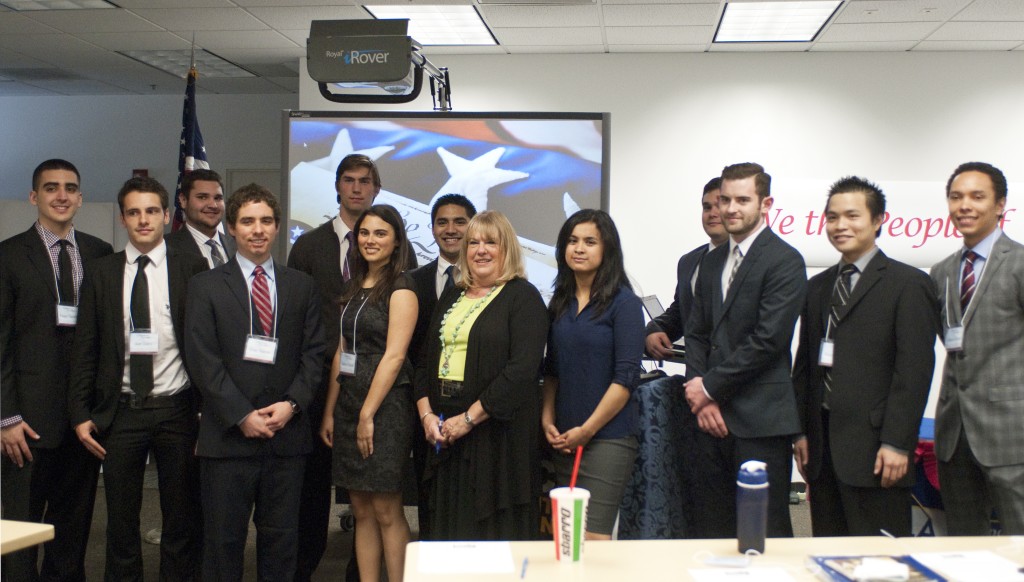An American flag, draped over a gold-colored pole, stood in front of a conference room in the UCLA Career Center. Posters bearing phrases from the preamble of the United States Constitution lined the room’s walls.
The decor was part of a mock constitutional convention hosted last week as the final exam for Political Science 149: “Politics in Action – Proposals for Amending the Constitution.”
Last Tuesday and Thursday, about 20 students proposed amendments to the U.S. Constitution, focusing on issues such as campaign finance, electoral college reform and privacy rights. Their lecturer, Cynthia Lebow, graded them while they presented. The convention was put together by Partnership UCLA, a unit within the UCLA Social Sciences Division that aims to connect students and alumni in the classroom environment, said Katrina Davy, director of Partnership UCLA.
The mock convention was Partnership UCLA’s first time working with the political science department, she added. The program has previously worked only with the economics department after Andrew Atkeson, a professor of economics and finance, introduced the idea of bringing alumni into the classroom about five years ago, she said.
Atkeson said lab courses like Political Science 149, a class in special topics in American government and politics, give students a broader range of real world skills.
“The students get to see that somebody, other than the teacher, cares (about) what they have to say,” he said.
The students in the political science class spent 10 weeks studying the Constitution, Lebow said. The midterm for the class consisted of a 15-page paper with the exact wording of the students’ proposed amendments, the rationale behind the amendments and the history of the topics in U.S. politics, she said.
The students’ work culminated in the convention presentations for the final, where they cited landmark Supreme Court cases pertaining to their amendment. The students also explained why they think their amendments are important.
After each student’s seven-minute presentation, the floor was opened to the room full of their peers and alumni for questions.
A group – or caucus, as the students referred to it – of six students proposed “The Privacy Rights Amendment,” asserting that U.S. citizens have a right to privacy of their digital, medical and personal information.
Much of the feedback given to the Privacy Rights caucus questioned its choice to exclude corporations or other government entities from the wording of the amendment. When it went to a vote, however, most of the alumni voted to pass the amendment.

Grady Joseph, a fourth-year political science student and a member of the privacy caucus, said he was interested in privacy rights before taking the class, and saw an opportunity to learn more about the topic in taking the course. He and his entire group presented different aspects of the amendment, from digital privacy to privacy of genetic material and personal information that could be obtained by drones.
Joseph and the other members of his group took turns speaking about their amendment during the convention.
Joseph said the class inspired them to take their ideas beyond the classroom environment.
“The convention really pushed me to learn the material better,” he said. “It’s a different story when you’re presenting to a room of people who are actually professionals and know what they’re talking about.”
Within the next few weeks, he said his group plans to hash out how they can get their amendment out in the real world through social media websites such as YouTube and Twitter.
Hagop Nazarian, a third-year political science student who presented an amendment on campaign finance at the mock convention, said the course allowed him to become passionate about his topic and helped him become an expert in a specific area of study.
Nazarian’s amendment limited the amount of money corporations can contribute to campaigns, and explicitly argued against the controversial Citizens United decision by maintaining that money is not a form of speech.
While his amendment received a lukewarm response from the alumni delegates, Nazarian said the process of researching and choosing the topic for his amendment made the schoolwork fun.
“I want everyone to know we really enjoyed this,” Nazarian said. “More departments should do stuff like this.”
